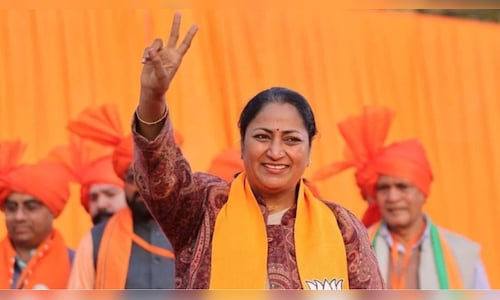Rekha Gupta’s appointment is a testament to the BJP’s emphasis on a balanced representation of caste, gender, and ideology. By selecting Gupta, the BJP aims to maintain a diverse representation within its leadership, reflecting Delhi’s varied demographics. Her strong connection with the Rashtriya Swayamsevak Sangh (RSS) and the Akhil Bharatiya Vidyarthi Parishad (ABVP) further cements her standing within the party, and it underscores the ideological continuity and loyalty that the BJP values in its leaders.
Moreover, Gupta’s rise highlights the BJP’s focus on empowering women in leadership roles. This move aligns with the party’s broader goal of promoting gender representation in governance. Gupta’s extensive experience in student politics and municipal governance, coupled with her grassroots connections, makes her a fresh face with a strong foundation.
The BJP’s strategic decision to appoint Rekha Gupta is not only about maintaining caste balance and rewarding long-term party workers but also about projecting a new vision for Delhi. Her appointment is expected to bring new energy and a fresh perspective to Delhi’s governance. As Gupta steps into this crucial role, the BJP must navigate the complexities of Delhi’s political landscape, balancing expectations and delivering on ambitious promises, when the party returns to power in the capital city state after 27 years.
Who Is Rekha Gupta
Born in 1974 in Nandgarh village, Haryana, Gupta’s family relocated to Delhi when she was two years old. She pursued her education in the city, earning a Bachelor of Commerce from Daulat Ram College, Delhi University, and later an LLB from Chaudhary Charan Singh University.
Gupta’s political journey commenced in 1992 with the Akhil Bharatiya Vidyarthi Parishad (ABVP) at Delhi University. Her leadership skills were soon recognised, leading to her election as the President of the Delhi University Students’ Union (DUSU) for the 1996-97 term. Transitioning to municipal politics, she served as a councillor from North Pitampura in 2007, focusing on enhancing local amenities and championing women’s education through initiatives like the “Sumedha Yojana,” which supports economically disadvantaged female students. Her dedication to women’s welfare was further evident during her tenure as Chair of the Women Welfare and Child Development Committee.
Within the BJP, Gupta has held significant positions, including General Secretary of the Delhi BJP Mahila Morcha and membership in the party’s national executive committee. In the 2025 Delhi Assembly elections, she contested from the Shalimar Bagh constituency, securing a decisive victory over Aam Aadmi Party’s Bandana Kumari by a margin of 29,595 votes. At 50, Gupta becomes Delhi’s fourth female Chief Minister, a testament to her enduring commitment to public service and the trust reposed in her by both the party and the electorate. Her leadership is anticipated to address pressing issues such as pollution and infrastructure development in the capital.
Balancing the Caste Equation with the Baniya Card
The BJP has long navigated Delhi’s electorate, which is a mosaic of caste and community identities, with calculated precision. Rekha Gupta, hailing from the Baniya community—a prominent trading class—offers the party a chance to consolidate support among this influential group. The Baniya community has been a reliable vote bank for the BJP, and Gupta’s selection reinforces this alliance. By choosing her over other contenders like Parvesh Verma or Vijender Gupta, the party subtly shifts away from a Punjabi or Jat-centric leadership model, broadening its caste appeal while rewarding a community that aligns with its economic ethos of trade and enterprise.
Gupta’s rise to the CM post is not just a political maneuver but a strategic alignment with the BJP’s broader vision of economic growth and stability. The Baniya community, known for its entrepreneurial spirit, resonates with the party’s agenda of promoting business-friendly policies and fostering a climate of enterprise. We expect this move to galvanise the trading community, ensuring their continued support and participation in the political process.
Moreover, Gupta’s selection sends a strong message about the BJP’s commitment to diversity and inclusivity. By elevating a woman from a traditionally business-oriented community, the party underscores its dedication to empowering different sections of society. The BJP must strike a balance to maintain its influence in Delhi and appeal to a wider range of voters.
Woman Factor as a Political Statement
For BJP, selecting Gupta as Delhi’s Chief Minister is both politically astute and symbolically powerful. As the fourth woman to hold the post, after Sushma Swaraj, Sheila Dikshit, and Atishi, her elevation aligns with the BJP’s larger push for “nari shakti” (women’s power) and comes at a crucial juncture when women voters are emerging as a decisive electoral force.
Gupta’s rise from student activism in the Akhil Bharatiya Vidyarthi Parishad (ABVP) to Delhi’s top post underscores the BJP’s attempt to counter opposition claims of gender imbalance within its leadership. With the 2025 Assembly elections approaching, her appointment is expected to reinforce the party’s outreach to women, particularly through welfare schemes like the ₹2,500 monthly allowance for women.
However, beyond the symbolism, Gupta faces significant governance challenges—from tackling pollution to addressing infrastructure bottlenecks. Whether she can translate BJP’s electoral promises into tangible results will test her leadership. For now, her appointment serves as both a strategic electoral move and a statement of intent on women’s leadership in Indian politics. Whether it translates into long-term political gains for the BJP in Delhi remains to be seen.
Rewarding Organisational Loyalty and RSS Roots
Gupta’s political journey—from her days in the Akhil Bharatiya Vidyarthi Parishad (ABVP) and Delhi University Students’ Union (DUSU) presidency to her tenure as a three-time municipal councillor—embodies the BJP’s preference for homegrown leaders with deep ties to its ideological parent, the Rashtriya Swayamsevak Sangh (RSS). Her unblemished record and lack of major controversies distinguish her from flashier contenders, making her a safe yet symbolic choice. This decision signals to the party cadre that loyalty and grassroots toil, rather than high-profile wins alone, can pave the way to leadership—a message that resonates with the RSS’s emphasis on discipline and organisational strength.
Fresh Face Factor
By sidestepping more prominent names, the BJP opts for a surprise pick, a tactic it has successfully employed in states like Uttar Pradesh and Uttarakhand, betting on Gupta to deliver without the weight of entrenched rivalries. Additionally, making Parvesh Verma the CM posed issues for the BJP due to his controversial statements and the perception of nepotism, being the son of former CM Sahib Singh Verma.
Gupta’s appointment aligns with the BJP’s ongoing emphasis on increasing female representation in politics and presents a departure from the past. Her fresh perspective and clean image make her an ideal choice for ushering in a new era for Delhi politics. With her at the helm, the BJP aims to build on the legacy of female leadership and deliver on its promises to the people of Delhi.
— The author, Prof. Sayantan Ghosh (@sayantan_gh), is a political observer and columnist who teaches journalism at St. Xavier’s College, Kolkata. The views expressed are personal.
Read his previous articles here


